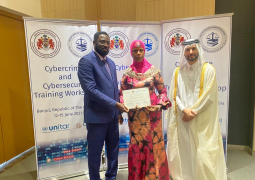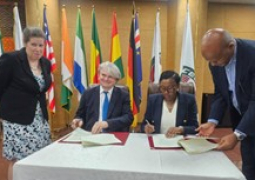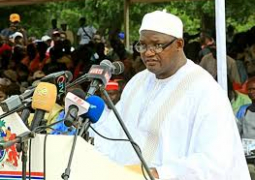
“The last year's groundnut trade season was a good one,” he said. “The groundnut trade season went fine in the sense that we surpassed our target.”
“We wanted to buy 30,000 metric tonnes of groundnut, but we ended up buying 40,000 metric tonnes of groundnut which amounts to more than one billion dalasis.”
Last week secco managers had planned to stage a protest amid claims of unpaid money owed by NFSPMC. However, the planned protest by the seccos managers had been called-off as the corporation had paid them.
“Again, the other aspect is that all the farmers that present their groundnuts to the ‘seccos’ were all paid. I can confirm to you that there is no amount of credit between the Corporation and the farmers,” Mr. Njie told our reporter in an exclusive interview yesterday
Reacting to the unpaid claims by secco managers, Mr. Njie said that they have all been paid their money.
“Some of the seccos were owed around D50 to 60 thousand dalasis. Besides, not all the seccos across the country were affected. What happened is that, at the end of each season, there is always a commission that is withheld until a final reconciliation is done. This is something that is known by all the seccos. This is an existing system that we are continuing with. We have to reconcile with the cooperative seccos and also with the banks with a view to know the true picture of what had been bought.”
“I can tell you that the period that we received the report that some seccos managers wanted to protest, found us already working on how to pay them their monies. As we speak, most of them have been settled and their commissions are payable pending the final reconciliation.”
However, it’s also important to note that when we finish the reconciliation and later realise that they also owe us, we are also going to subtract that money of which they have also agreed on.”
Plans for the GCC
Commenting on his plan for the Corporation, Njie said, part of his plans is to revitalise the Corporation by making it the leader in commodities processing and export in this country.
“We also want to diversify into other commodities. We want to get into rice and sugar among other commodities. With the existing projects we are doing with the Islamic Development Bank, we are optimistic of achieving these noble objectives,” he posited.
“I want to assure the farmers that the government of The Gambia is committed to their welfare and addressing issues affecting them. In fact, historically, the price of groundnut has never gone higher than the amount we are buying in recent years by the current government.”
Issue of fertiliser
On the issue of fertiliser, Mr. Njie said the reason for the price hike is the result the war in Ukraine.
“In fact, we are even lucky to have fertilisers in this country. Accessibility was a problem due to the fact that many countries were competing for the same fertilisers. Many countries in the world were scaling down their production because they couldn’t afford the price of fertilisers. The issue of fertilisers is a global problem and The Gambia is not an exception.”
The government, he continues, has done its best to reduce the price of fertilizers. “The total cost for the most expensive fertilizer which is Urea would have been D3900. But the government decided to subsidise it to 2000 dalasis. This is a huge investment in terms of budget for the government.”
Read Other Articles In Headlines

Cyber security training provides platform to address cyber threats – Dr Tangara
Jun 16, 2023, 10:39 AM




